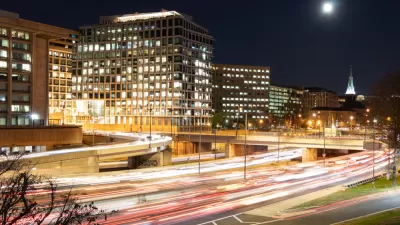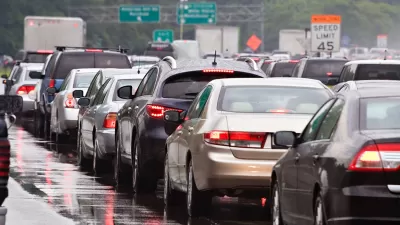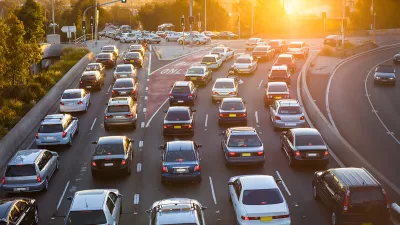Low transit ridership and a more dispersed daytime workforce are creating new headaches for car commuters in the D.C. area—in a story likely to be repeated all over the country as work returns to the office.

Since the beginning of the pandemic, prognosticators have pointed to the narrative about public health concerns and a new acceptance of telecommuting driving outward migration as a sign of congestion to come (Planetizen even mentioned congestion in its 2022 trends to watch post). With increasing numbers of workers returning to the office in recent weeks, it's time to check in again with the congestion beat.
Katherine Shaver reports for the Washington Post that traffic congestion has been getting notably worse in the D.C. area:
- "Morning traffic volumes on some arteries headed into downtown Washington grew, on average, by almost 9 percent between late February and early March, according to the District Department of Transportation."
- "Average morning speeds on northbound I-95 in Northern Virginia and part of the southbound Baltimore-Washington Parkway in Maryland have slowed from about 55 mph late last year to 46 mph, according to INRIX, a Seattle-area traffic analytics firm."
Shaver also provides the context for those congestion numbers by reporting other key factors:
- "Some commercial property managers report office buildings near 35 percent to 50 percent of pre-pandemic occupancies, while their parking garages are at 55 to 70 percent. Metrobus has hovered around 70 percent of pre-pandemic ridership for months. But Metrorail, whose customers generally have more opportunities to telework and drive, has lagged at about 30 percent this month."
As a final component of the congestion mix, Shaver reports: "Regional transportation planners say they are hearing that some carpools and van pools — most common among auto-dependent commuters from farther-out suburbs — haven’t reformed as trips to the office have become less regular."
The article includes soundbites from commuters who report their automobile commute experiences and share why they are choosing not to take transit when returning to the office after two years of working from home. The article provides a substantial debate from numerous sources about whether congestion and high gas prices might push some commuters to more efficient mode choices.
FULL STORY: As workers return to the office, experts see early signs of more driving

Planetizen Federal Action Tracker
A weekly monitor of how Trump’s orders and actions are impacting planners and planning in America.

Congressman Proposes Bill to Rename DC Metro “Trump Train”
The Make Autorail Great Again Act would withhold federal funding to the system until the Washington Metropolitan Area Transit Authority (WMATA), rebrands as the Washington Metropolitan Authority for Greater Access (WMAGA).

DARTSpace Platform Streamlines Dallas TOD Application Process
The Dallas transit agency hopes a shorter permitting timeline will boost transit-oriented development around rail stations.

Parks: Essential Community Infrastructure — and a Smart Investment
Even during times of budget constraint, continued investment in parks is critical, as they provide proven benefits to public health, safety, climate resilience, and community well-being — particularly for under-resourced communities.

Porches, Pets, and the People We Grow Old With
Neighborhood connections and animal companions matter to aging with dignity, and how we build can support them. Here’s a human-scale proposal for aging in place.

Single-Stair Design Contest Envisions Human-Scale Buildings
Single-stair building construction is having a resurgence in the United States, where, for the last several decades, zoning codes have required more than one staircase in multi-story housing developments.
Urban Design for Planners 1: Software Tools
This six-course series explores essential urban design concepts using open source software and equips planners with the tools they need to participate fully in the urban design process.
Planning for Universal Design
Learn the tools for implementing Universal Design in planning regulations.
City of Charlotte
Municipality of Princeton
City of Camden Redevelopment Agency
City of Astoria
Transportation Research & Education Center (TREC) at Portland State University
US High Speed Rail Association
City of Camden Redevelopment Agency
Municipality of Princeton (NJ)





























